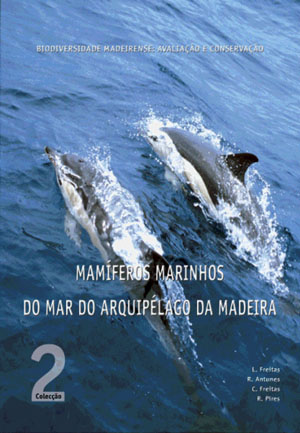Madeira's biodiversity: management and conservation
A. Madeira, A. Freitas & A. D.Abreu
Rua Dr. Pestana Júnior nº 6,
9050-558 Funchal,
Madeira, Portugal
 |
"Marine Mammals in Madeira's Archipelago
Waters", by L. Freitas
The Madeira Regional Government launched a three-year project -
"Madeira's Biodiversity: Management and Conservation" - to
bring up-to-date the knowledge on Madeira's biodiversity regarding to
it's conservation state, according to international criteria. The
regional scientific community - Madeira´s University, Whale Museum,
Funchal Natural History Museum, Botanical Garden - are working together
in this initiative, co-ordinated by the Environmental Regional
Government Department. The motto of this initiative, "Knowing to
Conserve", calls on the scientific community and the sphere of
influence in the region to participate in a common objective - the
conservation of the Natural Heritage.
Given the small dimensions of the area, Madeira's Archipelago has a
high density of species, including a high number of endemics. All
compiled data will be available, together with other environmental
parameters, in the Environmental Information Regional System.
Information will also be made available in such a way that Biodiversity
can be established as a central theme of nature conservation and
education activities, promoting a valorisation and preservation
political strategy with regard to Madeira's Natural Resources.
One of the first outputs of this project is the elaboration of
thematic booklets, each describing a group of species and it's
conservation state in Madeira. Regarding Marine Biodiversity the first
books published concerns Marine Mammals in the Madeira's Archipelago,
which was co-ordinated by L. Freitas (np53vj@mail.telepac.pt)
of the Whale Museum.
Marine mammals in Madeira's Archipelago and their present
conservation statute according to IUCN categories (1994)
| Species |
Conservation status |
| Eubalaena glacialis (Müller, 1776) |
Threatened species |
| Balaenoptera physalus (Linnaeus, 1758) |
Threatened species |
| Megaptera novaengliae (Borowski,
1781) |
Threatened species |
| Balaenoptera acutorostrata
(Lacépède, 1804) |
Lower risk species |
| Physeter macrocephalus (Linnaeus,
1758) |
Threatened species |
| Kogia breviceps (de Blainville, 1838) |
Data deficient |
| Ziphius cavirostris (Cuvier, 1823) |
Data deficient |
| Mesoplodon densirostris (de
Blainville, 1817) |
Data deficient |
| Mesoplodon bidens (Sowerby, 1804) |
Data deficient |
| Orcinus orca (Linnaeus, 1758) |
Lower risk species |
| Pseudorca crassidens (Owen, 1846) |
Not evaluated |
| Globicephala macrorhynchus (Lesson,
1828) |
Lower risk species |
| Grampus griseus (Cuvier, 1812) |
Data deficient |
| Tursiops truncatus (Montagu, 1821) |
Data deficient |
| Steno bredanensis (Lesson, 1828) |
Data deficient |
| Delphinus delphis (Linnaeus, 1758) |
Data deficient |
| Stenella frontalis (Cuvier, 1829) |
Data deficient |
| Stenella coeruleoalba (Meyen, 1833) |
Lower risk species |
| Monachus monachus (Hermann, 1779) |
Threatened species |
|
Since 1986, cetaceans are protected in Madeira by legislative
measures. However, these measures have not been followed by management
measures or monitoring programme, to enable the identification of
threats to the cetaceans populations. In 1999, a LIFE-Nature project
started and aims at the conservation of cetacean's populations in
Madeira's archipelago waters.
At present, in Madeira some problems affecting the species can be
pinpointed. Namely, intensive maritime traffic in the south coast of
Madeira, unregulated whale-watching and dolphin-watching activity,
performed on a rather opportunistic basis by unprepared operators, and
negative interactions between cetaceans and humans (e.g. fishermen,
litter) resulting in the direct death of animals. In order to overcome
these problems, four specific objectives have been established:
- To determine the conservation status of Tursiops truncates,
Stenella frontalis and Globicephala macrorhynchus in Madeira's
archipelago waters.
- To determine the impact on cetaceans, especially on the species
mentioned above, of whale-watching and dolphin-watching activities,
witch are been carried out by the coastal tourist boats and big game
fishing boats, and to propose measures to reduce the impact.
- To raise awareness of the population, especially the fishing
villages inhabitants and the users of the sea, to the conservation of
cetaceans, mainly on what concerns the harmful impact the litter thrown
to sea can have on these animals.
Contact
- Secretaria Regional do Ambiente e dos
Recursos Naturais
- Direcção Regional do Ambiente
- Rua Dr. Pestana Júnior n.º6, 3º
Dtº
- P-9054-558 Funchal
- E-mail: dramb.sra@gov-madeira.pt
|
- To raise the awareness of tourists, that are majority of coastal
tourists boats and big game fishing boats customers, for the disturbance
they can cause to the cetaceans, in an attempt to encourage the tourists
to became agents of conservation.
The monk seal (Monachus monachus) has been protected by
legislation implemented by Madeira's Regional Government and was also
embraced by a LIFE-Nature project aiming for its habitat (Deserts
Islands) conservation.
|
